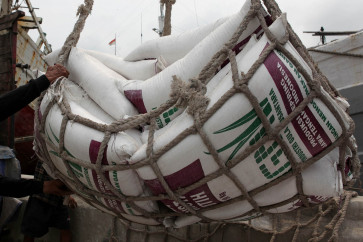Popular Reads
Top Results
Can't find what you're looking for?
View all search resultsPopular Reads
Top Results
Can't find what you're looking for?
View all search resultsInsight: Public apathy and the politics of indifference
On one of our national TV channels, famous poet Taufiq Ismail was quoted as asking how we can be so deplorable in managing our own state affairs
Change text size
Gift Premium Articles
to Anyone
O
n one of our national TV channels, famous poet Taufiq Ismail was quoted as asking how we can be so deplorable in managing our own state affairs. His remarks obviously reflect a certain degree of frustration concerning the country’s social, economic and political situation. It seems that no one is willing to assume genuine responsibility for Indonesia’s current circumstances.
Taufiq is not the only one harboring such feelings. Many of his fellow citizens share similar perceptions. Many more, perhaps, have even already developed a sense of apathy. This means that they do not care anymore about whatever the government intends to do in carrying out its duties and obligations.
Such public apathy has been around for quite sometime, reflected particularly in the general perception that the government has been absent in many pressing issues. The government has failed to take the necessary measures to tackle important problems. As a result, violence, corruption and many other social, economic and political ill-deeds have become even more prevalent.
In the midst of our own problems, as outlined above, a shocking report came out. Our Human Development Index (HDI) plummeted to an unprecedented level. It is now ranked at 124th — well below Singapore (26th), Brunei (33rd), Malaysia (61st), Thailand (103rd), the Philippines (112nd), and only points above Vietnam (128th), Laos (138th), Cambodia (139th) and Myanmar (149th).
Shamefully, instead of accepting the report and treating it as a point of departure to reflect upon our imperfections and pitfalls in managing our education, health, and economy, our leaders blamed the UNDP, the agency that prepared and issued the report. In their view, it was the agency’s fault for increasing the standard of evaluation that placed Indonesia at an even lower rank than a year
before (108th).
In addition to the HDI issue, other serious problems mentioned above have also become regular over the last several years. Nothing has seemed to work as intended during the first two years of President Susilo Bambang Yudhoyono’s second term. As he himself has admitted, only 50 percent of his instructions were carried out by his ministers.
The unfortunate circumstances served as catalysts for the President’s cabinet reshuffle in October. For almost one month, public attention shifted from violence, corruption and many other problems to a high-profile cabinet shake-up. While perceived by many optimists as a possible panacea to Indonesia’s pressing problems, it only turned out confirming pessimists’ apprehensions that a cabinet shake-up would serve no such purpose. The way the Cabinet has been restructured and the ministers were appointed or reappointed only demonstrated the depth of the problems and our mediocre approach to addressing them.
It has been just over two weeks since the formation of the new Cabinet. Ministers and their deputies certainly need to adjust themselves to their new situations. However, even when the period of adjustment has been completed, given the circumstances described above, we most likely will again be witness to the same old problems.
Our problems can be very difficult, but at the same time they are easy to handle. They are all centered on one and only one thing: the willingness of the state apparatus and the national and regional political elites to enforce and uphold the law with an absolute degree of fairness and justice. The root of all the evils that have haunted us is our inability and our unwillingness to enforce the law — the mother or all rules of
the game.
This inability or unwillingness has been largely due to the fact that many of those holding public office are not law abiding citizens. Should they be forced to overcome the nation’s problems by upholding the law, they obviously would become the first and primary targets.
It is in this context that our problems are difficult to tackle. Waiting for new leadership in 2014 will not mean much if we are unable to elect new public officials who are law-abiding citizens. Should our democratic elections fail to produce new leadership with such qualities, we will only suffer an even stronger sense of public apathy on the one hand, and state indifference on the other.










